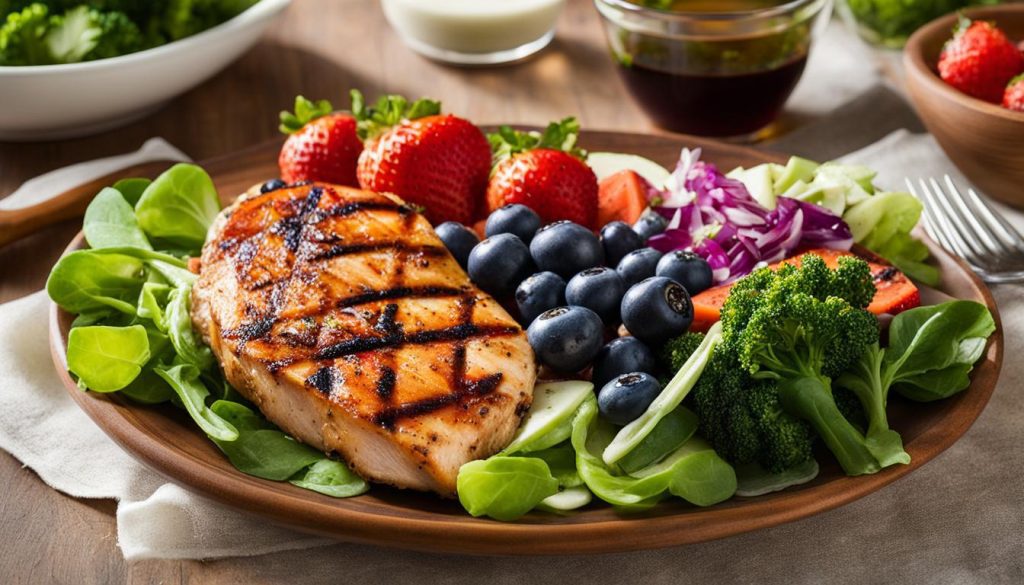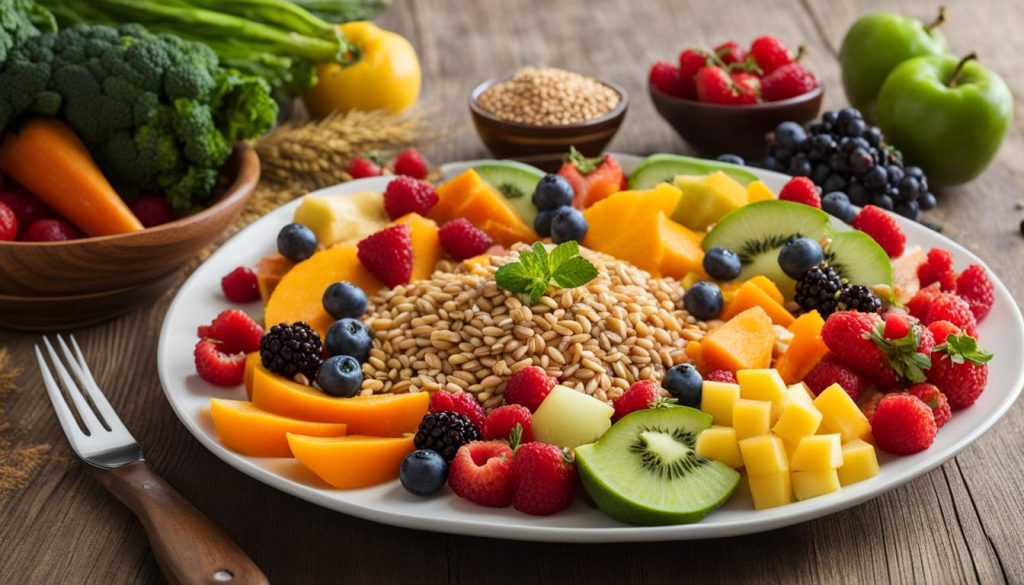1000 calorie meal plan might be just what you need if you are looking for something different to change your life. With a low calorie diet, you can achieve your weight loss goals while ensuring that you still get all the essential nutrients your body needs. Let me guide you through the benefits, meal ideas, and tips for successfully following any 1000 calorie meal plan.
A 1000 calorie meal plan promotes weight loss by creating a calorie deficit.
- It focuses on whole, nutrient-dense foods to meet your nutritional needs.
- Portion control and careful planning are essential when creating a 1000 calorie meal plan.
- Preparing meals in advance and tracking your calorie intake can help you stay on track.
- Consult with a healthcare professional or registered dietitian before starting any new diet or meal plan.
Understanding the 1000 Calorie Traditional Meal Plan
When it comes to following a 1000 calorie meal plan, understanding the traditional approach is key. This method consists of three main meals and a snack each day, carefully portioned to provide a balance of nutrients without exceeding the calorie limit. By focusing on low-calorie but nutritious ingredients, this meal plan ensures you stay on track with your weight loss goals while still enjoying delicious meals.
For breakfast, a typical 1000 calorie meal plan could include scrambled eggs, whole wheat toast, a side of yogurt, and a handful of berries. This combination provides protein, complex carbohydrates, and essential vitamins to kickstart your day. Moving on to lunch, options like a turkey or chicken sandwich on whole grain bread with a side salad offer a satisfying and nutritious midday meal.
When it comes to dinner, the 1000 calorie traditional meal plan might feature grilled chicken or fish as the main protein source. This can be paired with a side of pasta or a variety of steamed vegetables. Finally, for a snack, baby carrots with a serving of hummus can provide a satisfying crunch and additional nutrients.
Portion Control is Key
One of the essential aspects of the 1000 calorie traditional meal plan is portion control. By carefully measuring and controlling the amount of food you consume, you ensure that you stay within the desired calorie range. This can be achieved through the use of measuring cups, food scales, or portion control containers. By practicing portion control, you can still enjoy a variety of foods while maintaining a healthy calorie intake.
Overall, the 1000 calorie traditional meal plan is a simple and effective way to support your weight loss journey. By understanding the components of each meal and practicing portion control, you can create a balanced and satisfying meal plan while keeping your calorie count in check.
Benefits of a 1000-Calorie Meal Plan
A 1000-calorie meal plan offers numerous benefits for individuals seeking a healthy meal plan and balanced diet while aiming for weight loss. The primary advantage is that it creates a calorie deficit, which is crucial for shedding pounds. By consuming fewer calories than your body needs, you can tap into stored fat as an energy source, resulting in weight loss over time.
The Power of Portion Control
One of the key elements of a 1000-calorie meal plan is portion control. By carefully measuring and selecting appropriate portions of nutrient-dense foods, you can ensure you’re not consuming excess calories. This approach trains your body to adjust to smaller serving sizes, helping maintain a healthy weight in the long run. While portion control may take some time to get used to, it becomes easier with practice and awareness.
Nutrient-Dense Foods for Optimal Nutrition
A 1000-calorie meal plan emphasizes whole, nutrient-dense foods to provide essential vitamins and minerals. By focusing on lean proteins, whole grains, fruits, vegetables, and healthy fats, you can ensure your body receives the nutrients it needs despite the lower calorie intake. This way, you promote overall health and well-being while working towards your weight loss goals.
By following a 1000-calorie meal plan, you can experience the benefits of weight loss, portion control, and optimal nutrition. Remember, it’s important to consult with a healthcare professional or a registered dietitian before starting any new diet or meal plan to ensure it aligns with your specific needs and health goals.

How to Create a 1000-Calorie Meal Plan
Creating an effective 1000-calorie meal plan involves careful consideration of nutrient density and portion sizes. By focusing on foods that are rich in essential vitamins and minerals, you can ensure that your body receives the necessary nutrients while staying within your calorie limit.
Start by incorporating lean proteins such as grilled chicken, turkey, or fish into your meals. These protein sources are low in calories and high in nutrients, helping to keep you feeling satisfied and supporting muscle growth. Combine them with whole grains like brown rice or quinoa, which are high in fiber and provide sustained energy.
Make fruits and vegetables a key component of your 1000-calorie meal plan. These nutrient-dense foods are low in calories and high in vitamins, minerals, and antioxidants. Aim for a variety of colors to ensure you’re getting a wide range of nutrients. Lastly, include healthy fats like avocado, nuts, and olive oil in moderation. These fats are important for brain function and hormone regulation.
Tracking and Adjusting
Calorie counting is crucial when following a 1000-calorie meal plan. Utilize a food diary or mobile app to track your daily calorie intake and ensure you stay within your goal. Keep in mind that everyone’s nutritional needs may vary, so it’s essential to listen to your body and make adjustments as needed. If you feel overly fatigued or are not seeing the desired results, consider consulting with a healthcare professional or registered dietitian for personalized guidance.
Remember to practice moderation and balance in your meal plan. While a 1000-calorie meal plan can be effective for weight loss, it’s important to prioritize your overall health and well-being. Incorporate physical activity into your routine and stay properly hydrated throughout the day. With careful planning and commitment, you can create a sustainable 1000-calorie meal plan that supports your goals and promotes a healthy lifestyle.

Tips for Successfully Following a 1000-Calorie Meal Plan
Successfully following a 1000-calorie meal plan requires dedication and mindful choices. Here are some tips to help you stay on track with your weight loss journey:
1. Plan and Prep Your Meals in Advance
Take the time to plan out your meals for the week and prepare them in advance. This will not only save you time and effort during the week but also ensure that you have healthy, calorie-controlled options readily available. Use portion control containers or a food scale to measure out your servings to stay within your calorie target.
2. Keep a Food Diary
Keeping a food diary can help you track your calorie intake and hold yourself accountable. Write down everything you eat and drink, including portion sizes. This will give you a clear picture of your eating habits and help you identify any areas where you may be overindulging or not getting enough nutrients. It’s also a great way to identify patterns and triggers that may be impacting your progress.
3. Stay Hydrated
Drinking enough water throughout the day is essential for overall health and weight loss. Not only does it help keep you hydrated, but it can also help curb cravings and prevent overeating. Aim to drink at least 8 cups (64 ounces) of water per day, and consider having a glass of water before each meal to help control your appetite.
4. Incorporate Physical Activity
While a 1000-calorie meal plan can contribute to weight loss, incorporating physical activity into your routine can further enhance your results. Engage in at least 150 minutes of moderate-intensity aerobic activity or 75 minutes of vigorous-intensity aerobic activity each week. Additionally, include strength training exercises to help build lean muscle mass, which can boost your metabolism and aid in weight loss.
5. Seek Support
Embarking on a weight loss journey can be challenging, so don’t hesitate to seek support from a healthcare professional or a registered dietitian. They can provide personalized guidance and help you create a meal plan that suits your specific needs and preferences. They can also offer motivation and accountability to help you stay on track and achieve your weight loss goals.
Conclusion
In conclusion, a 1000 calorie meal plan can be a highly effective tool for achieving weight loss and maintaining a balanced diet. By carefully selecting nutrient-dense foods and practicing portion control, you can create a meal plan that supports your weight loss goals without compromising on essential nutrients.
Remember, it’s always important to consult with a healthcare professional or registered dietitian before embarking on any new diet or meal plan. They can provide personalized guidance and ensure that the 1000 calorie plan is suitable for your individual needs and health conditions.
With proper planning, commitment, and the right professional guidance, you can achieve your weight loss goals and maintain a healthy lifestyle. So, start your 1000 calorie meal plan today and take a step towards a healthier and happier you!
FAQ
Is a 1000 calorie meal plan effective for weight loss?
Yes, a 1000 calorie meal plan can be an effective way to promote weight loss while ensuring a balanced and nutritious diet.
How much weight can I expect to lose with a 1000 calorie meal plan?
By following a 1000 calorie meal plan, you can expect to lose around 1-2 pounds per week.
What does a typical 1000 calorie meal plan consist of?
A 1000 calorie meal plan typically includes three main meals and a snack each day, with portioned meals that provide a balance of protein, carbohydrates, and fats.
What are the benefits of following a 1000 calorie meal plan?
Some benefits of following a 1000 calorie meal plan include promoting weight loss, regulating portion sizes, focusing on nutrient-dense foods, and maintaining a balanced diet.
What foods should I include in a 1000 calorie meal plan?
It’s important to focus on nutrient-dense foods such as lean proteins, whole grains, fruits, vegetables, and healthy fats when creating a 1000 calorie meal plan.
How can I successfully follow a 1000 calorie meal plan?
Tips for successfully following a 1000 calorie meal plan include planning and prepping meals in advance, keeping a food diary to track calorie intake, staying hydrated, incorporating physical activity, and seeking professional support.
Should I consult with a healthcare professional before starting a 1000 calorie meal plan?
Yes, it’s always best to consult with a healthcare professional or registered dietitian before starting any new diet or meal plan to ensure it meets your individual nutritional needs.




